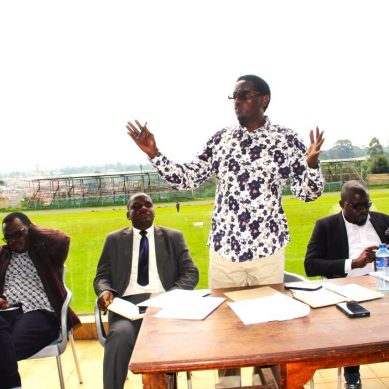
The death – by suicide – of a primary school student in Lugari in Kakamega County in western Kenya is likely to reignite debate on the pesky subject the ministries of internal security and health and the judiciary, which in 2023 described as alarming as the high incidence of young people taking their lives that shook the East African nation.
The latest statistic is that of a minor aged 14 and a pupil at Macho Muslim Primary School in Lugari, who lived with his grandmother and is said to have disappeared mysteriously after the granny left home for church on Sunday. However, upon return she found the boy missing and attempts to trace him yielded no results.
The grandmother, Elsheba Mbone Malavi, told police that the deceased had been in high spirits and had not shown signs of distress.
“On Sunday before I left for church, he was fine and in high spirits. He even wished me well and asked me to take care of myself. That was at around 10 o’clock. Unfortunately, when I came back I didn’t find him.
Between 2021 and 2023, Kenya was rocked by high incidence of students in primary and secondary schools, colleges and universities committing suicide in in what mental and security experts at the time tried to link – without plausible evidence – the galloping costing of living.
According to media reports at the time, the most affected demographic were young people under the age of 30 years. Desegregation of suicide incidents by gender showed men were the more likely to take their lives compared to women, irrespective of the age bracket, the level of education, income levels or ethnicity or race.
A common thread in all local cultures is stigmatisation of suicide as a curse, an outcome of witchcraft or hereditary. Citing documented incidents in Kenya, Linnet Ongeri, a psychiatrist and a mental health researcher, says the drivers of suicide are complex, but majority are impulsive.
“Suicide is a complex issue. It results from the interplay of various factors, including genetic, biological, psychological, socioeconomic and cultural influences,” says Dr Ongeri.
She, however, says there is a strong link between suicide and mental health disorders and “many suicides occur impulsively during moments of crisis or in response to significant life challenges.
She lists some of the challenges as denial of basic rights and access to resources, a loss of livelihood, academic or work-related pressures, relationship breakdowns and other life crises.
Against this backdrop police in Lugari say they are investigating circumstances under which the minor committed suicide or if he was murdered and the body dumped in the abandoned house where the body was recovered.
Sub County Police Commander Julius Melly confirmed investigations into the incident have commenced to unravel the cause of the death.
“I have already directed the Pan Paper Officer Commanding Station to fasttrack investigations into the matter to ascertain the truth if the boy truly committed suicide,” he said.
According to the deceased’s grandmother, “His (grandson’s) prolonged absence became a matter of concern. I tried calling some of our relatives to find out if he had gone to visit them, but the response was in the negative. Attempts by his young brother and friends to look for him were also in vain. It was not until yesterday morning when his brother who was preparing to go to school went to their uncle’s unfinished house to change clothes that he discovered his brother’s body.”
As high rates of suicide shook the country two years ago, Chief Justice Martha Koome, called for a review to decriminalise attempted suicide. Justice Koome noted that stigmatising views portray suicide as a sign of weakness or failure, rather than a result of deep emotional distress or mental health challenges.
In Kenya, Section 226 of the penal code states that any person who tries to kill him or herself is guilty of a misdemeanour. He or she is liable to imprisonment of up to two years, a fine, or both. This law, inherited from the English common law, has been repealed in several countries globally.
Chief Justice Koome observed that the threat of legal sanctions for a suicide survivor, who is already experiencing severe mental anguish and emotional distress, can have serious negative repercussions. Punitive measures can worsen an individual’s mental health, increase their sense of isolation and make them more vulnerable. This heightens the risk of suicidal behaviour.
In 2020, a report by a national taskforce on mental health also called for decriminalisation of attempted suicide. It also called for a national suicide registry to improve access to mental healthcare, suicide crisis support and data on suicide and suicidal attempts. These recommendations would support the country’s suicide prevention strategy.
In the same year, the Kenya National Commission on Human Rights filed a constitutional petition to repeal Section 226 of the penal code, deeming it unconstitutional. The petition argued that the current law violates the rights of individuals living with mental health conditions. A final judgment on this case has yet to be made.
According to the World Health Organization (WHO) data, one in every 100 deaths globally is by suicide. It adds that more than 700,000 people die by suicide every year and a staggering 77 per cent of suicides occur in low- and middle-income countries, with the Africa bearing the highest burden at a rate of 11.2 deaths per 100,000 people.
WHO says that in Kenya, the crude suicide rate is 6.1 deaths per 100,000 people and men are three times more likely to die by suicide than women.
- A Tell / KNA report / By Melechezedeck Ejakaits
Photo (File): Lugari Police Commander Julius Melly speaks at a past security meeting in the sub county








